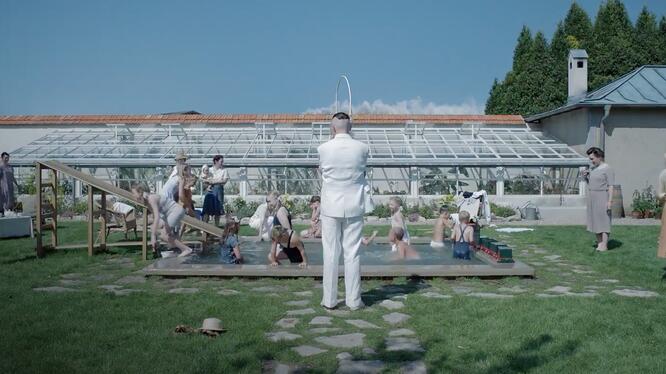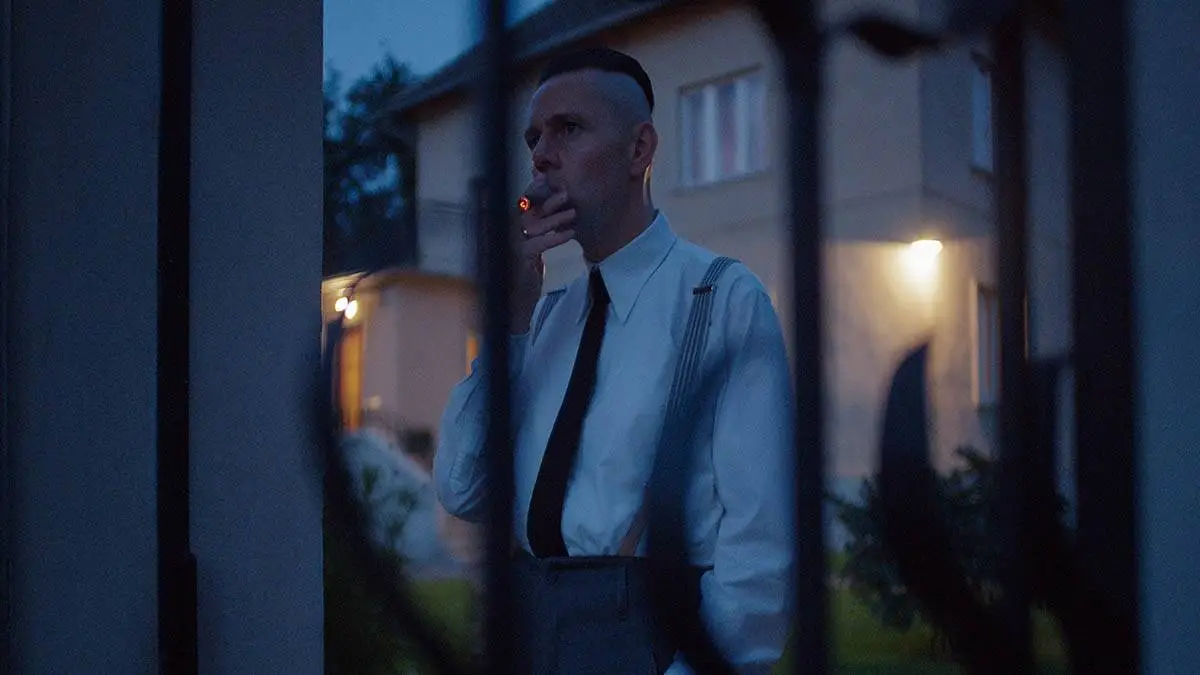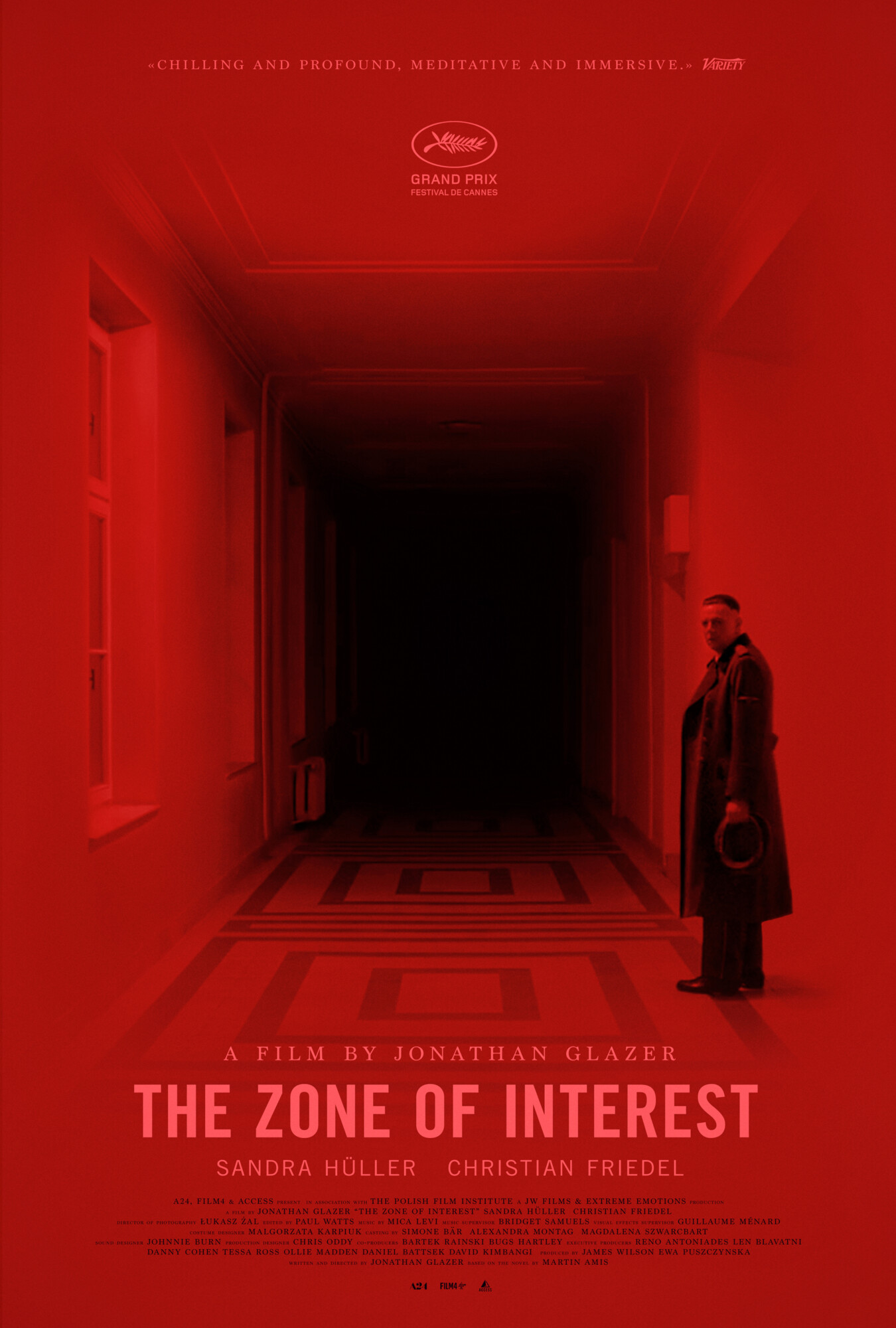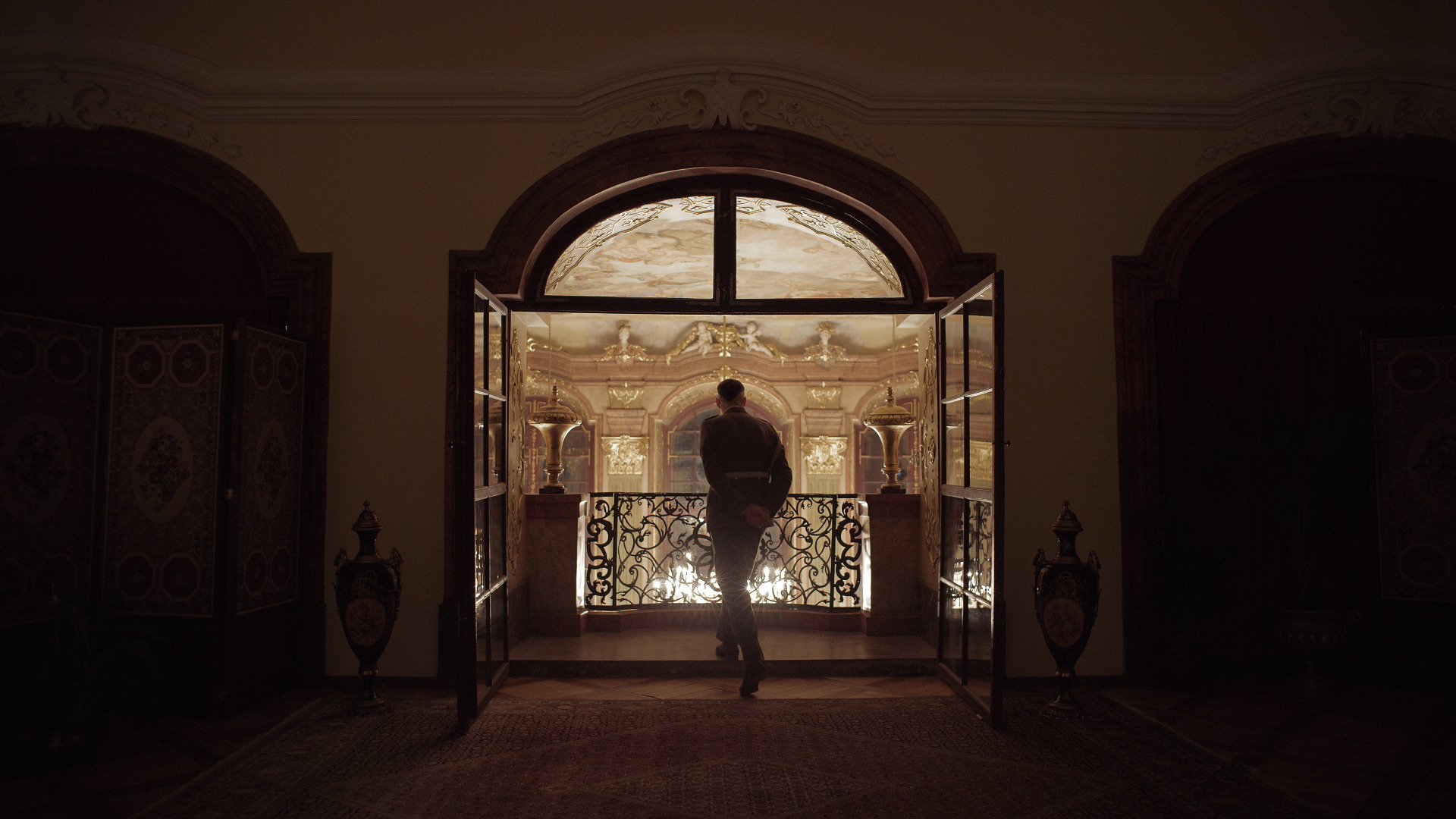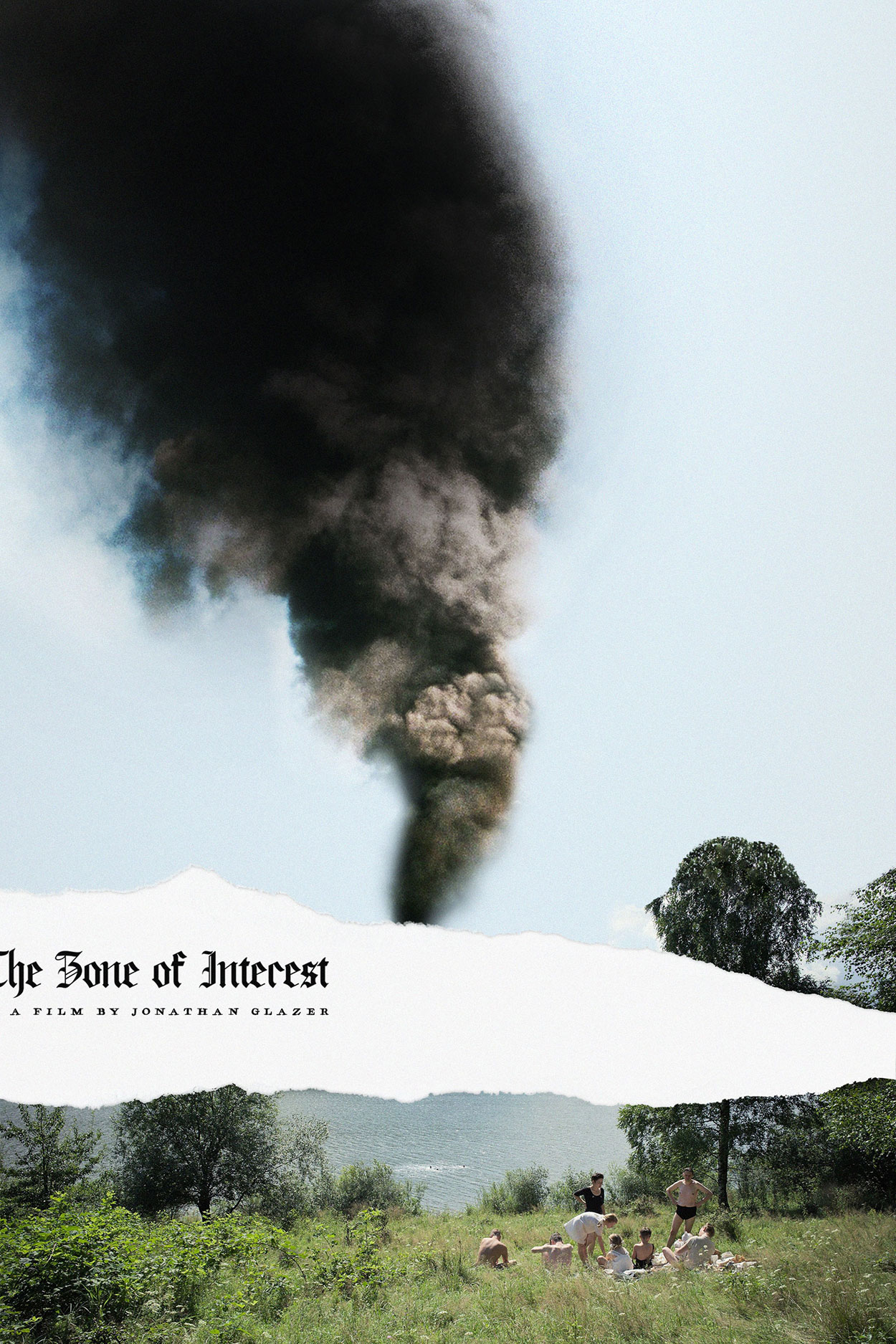Victory's Fire
-
Douglas Mercer
- Posts: 10948
- Joined: Tue Mar 28, 2023 7:29 pm
Victory's Fire
Douglas Mercer
May 29 2024
It is the simple things in life that count, wouldn’t you agree? And it was Sophocles who said that one does not know how beautiful the day has been until the cool of the evening. By sheer inadvertence the movie The Zone Of Interest gives us such a message, despite its quintessentially Jewish designs it has on the audience. A hard-working German man is the Commandant of Auschwitz; his wife says that he works nonstop and that he loves it. And why not, right? It is not given to every generation to be the honored ones to finally put an end to Jewish evil. And the ones to whom that signal laurel was given were dedicated to the cause without reserve and worked themselves to the bone to see their life enhancing mission enacted on the sacred earth. But even a Hyperborean needs to take some time off now and again and what better time to relax and reflect than one’s birthday. On the day in question the Commandant is given by his family a luxurious canoe with which he can explore the river which runs softly near the camp; it’s a way to get away from the incessant screaming of the Jews and get in touch with Mother Nature. Then the men who work beneath him at the camp appear in the morning as a congregation in front of his house to give a warm celebration to their leader. This shows that for the National Socialists the spirit of community comes first, they may seem a hard and reserved lot but it is love and love alone which underpins their relationship. A hard love to be sure, but if there is any other kind I’ve never known it. And then after an arduous day in which on horseback he witnesses some Jewish laborers being led through a meadow he retires to where he is the lord of the manner, to his home where he will spend time with his wife and his four children. A large cake is on the table, the baby is crying, and the children are beautiful. The husband and the wife exchange some lighthearted conversation, and it is obvious that all are at ease; it has been another hard day of work but for the Commandant this is the scene which makes it all worthwhile, a scene which for him is fragrant of the future. Next we see him standing alone his in his paradise courtyard serenely smoking a cigar, the shot of his face tells us he is in deep contemplation; of what one might ask? Why, of course of that very future and of the coming victory. He is pensive but not troubled, he knows the price they are all paying but has no doubt that it is worth it, more than worth it. He knows you only get what you work for. Then he begins to walk around the yard and we hear dogs howling and voices being raised across the wall; the director wants you to think of the evil which is behind perpetrated across the way but don’t believe it; across the way are where the seeds of eternity are being sown, where life is being created; the Commandant then goes to the little body of water that has been placed in the center of the yard, a sacred pool you might say, and he turns on a shower above it to let even more water in to the holy fountain; still calmly smoking his cigar he raises his gaze, perfectly poised, and stares into the near distance; there he sees (and we see in the midpoint of the screen) a chimney, from which gray smoke is billowing ostentatiously out of the flue; at the base of the billowing we see a bit of deep orange redolent of fire; he looks at this for a while, thinks about it as it were, and then without a care in the world he simply turns around. He literally turns his back on it. You see he knows what that chimney, that flue, that fire, and that smoke are and mean: dead Jews (or so they want you to believe). Does he get soft hearted about it? Are his heart strings being pulled? Has his head gone soft with pity? No, no and no: and no once again. In fact he does not think about it much at all except to think that this is the price of victory, that the bodies being burnt (to pretend with them that is) are the fodder of the future, fat thrown into the fire, that the future might live. For he knows that whatever enhances life is good, and whatever causes it to suffer diminution is bad; it’s as simple as that. And somewhere too in his mind his memory is long; he knows what the Jews have done to his people; and he knows that there is justice on earth, and that he is enacting it. But such thoughts do not occupy his mind for long. It is his birthday after all and the future is not there behind him; the future is ahead, and near at hand; the future is back in the house, the future is in his mind and soon to be flourishing in the world. He has turned his back on what has plagued the German people and only has eyes for destiny. The Jewish directors surely wants the viewer to see this as looking away from evil, of ignoring it or evading it or sweeping it under the rug; but he has it exactly wrong, it is nothing of the sort; it is turning around to see victory coming, victory in all its glory, and paying no heed to the dead past. And so at the scene’s finish we see the commandant, still calm and still smoking his cigar, rapt and wrapped in sweet and wonderful thoughts, and of course we can still see the fire and smoke, but he cannot. After all on the day of one’s birth one has better things to think of than dead Jews; one has the recollection of the day, and the beautiful solitude of the night. And so he continues to rest his perfect contemplation; tomorrow will be another day of hard work but the hard work will not be endless; for it will be in paradise that we recall the splendor of what life has been and what it is and what it always will be.
May 29 2024
It is the simple things in life that count, wouldn’t you agree? And it was Sophocles who said that one does not know how beautiful the day has been until the cool of the evening. By sheer inadvertence the movie The Zone Of Interest gives us such a message, despite its quintessentially Jewish designs it has on the audience. A hard-working German man is the Commandant of Auschwitz; his wife says that he works nonstop and that he loves it. And why not, right? It is not given to every generation to be the honored ones to finally put an end to Jewish evil. And the ones to whom that signal laurel was given were dedicated to the cause without reserve and worked themselves to the bone to see their life enhancing mission enacted on the sacred earth. But even a Hyperborean needs to take some time off now and again and what better time to relax and reflect than one’s birthday. On the day in question the Commandant is given by his family a luxurious canoe with which he can explore the river which runs softly near the camp; it’s a way to get away from the incessant screaming of the Jews and get in touch with Mother Nature. Then the men who work beneath him at the camp appear in the morning as a congregation in front of his house to give a warm celebration to their leader. This shows that for the National Socialists the spirit of community comes first, they may seem a hard and reserved lot but it is love and love alone which underpins their relationship. A hard love to be sure, but if there is any other kind I’ve never known it. And then after an arduous day in which on horseback he witnesses some Jewish laborers being led through a meadow he retires to where he is the lord of the manner, to his home where he will spend time with his wife and his four children. A large cake is on the table, the baby is crying, and the children are beautiful. The husband and the wife exchange some lighthearted conversation, and it is obvious that all are at ease; it has been another hard day of work but for the Commandant this is the scene which makes it all worthwhile, a scene which for him is fragrant of the future. Next we see him standing alone his in his paradise courtyard serenely smoking a cigar, the shot of his face tells us he is in deep contemplation; of what one might ask? Why, of course of that very future and of the coming victory. He is pensive but not troubled, he knows the price they are all paying but has no doubt that it is worth it, more than worth it. He knows you only get what you work for. Then he begins to walk around the yard and we hear dogs howling and voices being raised across the wall; the director wants you to think of the evil which is behind perpetrated across the way but don’t believe it; across the way are where the seeds of eternity are being sown, where life is being created; the Commandant then goes to the little body of water that has been placed in the center of the yard, a sacred pool you might say, and he turns on a shower above it to let even more water in to the holy fountain; still calmly smoking his cigar he raises his gaze, perfectly poised, and stares into the near distance; there he sees (and we see in the midpoint of the screen) a chimney, from which gray smoke is billowing ostentatiously out of the flue; at the base of the billowing we see a bit of deep orange redolent of fire; he looks at this for a while, thinks about it as it were, and then without a care in the world he simply turns around. He literally turns his back on it. You see he knows what that chimney, that flue, that fire, and that smoke are and mean: dead Jews (or so they want you to believe). Does he get soft hearted about it? Are his heart strings being pulled? Has his head gone soft with pity? No, no and no: and no once again. In fact he does not think about it much at all except to think that this is the price of victory, that the bodies being burnt (to pretend with them that is) are the fodder of the future, fat thrown into the fire, that the future might live. For he knows that whatever enhances life is good, and whatever causes it to suffer diminution is bad; it’s as simple as that. And somewhere too in his mind his memory is long; he knows what the Jews have done to his people; and he knows that there is justice on earth, and that he is enacting it. But such thoughts do not occupy his mind for long. It is his birthday after all and the future is not there behind him; the future is ahead, and near at hand; the future is back in the house, the future is in his mind and soon to be flourishing in the world. He has turned his back on what has plagued the German people and only has eyes for destiny. The Jewish directors surely wants the viewer to see this as looking away from evil, of ignoring it or evading it or sweeping it under the rug; but he has it exactly wrong, it is nothing of the sort; it is turning around to see victory coming, victory in all its glory, and paying no heed to the dead past. And so at the scene’s finish we see the commandant, still calm and still smoking his cigar, rapt and wrapped in sweet and wonderful thoughts, and of course we can still see the fire and smoke, but he cannot. After all on the day of one’s birth one has better things to think of than dead Jews; one has the recollection of the day, and the beautiful solitude of the night. And so he continues to rest his perfect contemplation; tomorrow will be another day of hard work but the hard work will not be endless; for it will be in paradise that we recall the splendor of what life has been and what it is and what it always will be.
-
Douglas Mercer
- Posts: 10948
- Joined: Tue Mar 28, 2023 7:29 pm
- Will Williams
- Posts: 5539
- Joined: Sun Jul 28, 2013 9:22 am
Re: Victory's Fire
Thanks to you, Douglas, the truth is coming out about fictionalized The Zone of Interest as much as with Steven Spielberg's fictionalized Schindler's List. More truth about such Jewish guilt-tripping Holocaust propaganda will eventually come out in bits and spurts, like in the first sentence of this Jewish puff piece, here: https://www.thedailybeast.com/the-comma ... f-interestDouglas Mercer wrote: ↑Wed May 29, 2024 10:30 pmDouglas Mercer
May 29 2024
It is the simple things in life that count, wouldn’t you agree? And it was Sophocles who said that one does not know how beautiful the day has been until the cool of the evening. By sheer inadvertence the movie The Zone Of Interest gives us such a message, despite its quintessentially Jewish designs it has on the audience. A hard-working German man is the Commandant of Auschwitz; his wife says that he works nonstop and that he loves it. And why not, right? It is not given to every generation to be the honored ones to finally put an end to Jewish evil. And the ones to whom that signal laurel was given were dedicated to the cause without reserve and worked themselves to the bone to see their life enhancing mission enacted on the sacred earth...
The Traumatic True Story
Behind ‘The Zone of Interest’
In the documentary “The Commandant’s Shadow,” concentration camp leader Rudolf Höss’ family attempts to reckon with his sins as “the greatest mass murderer in human history.”
(((Nick Schager)))
Entertainment Critic
Updated May 29, 2024
Jonathan Glazer’s Oscar-winning The Zone of Interest—a fictionalized study of the domestic life of Rudolf Höss, the Auschwitz-Birkenau concentration camp commandant whose family lived right beside his workplace...
If Whites insist on participating in "social media," do so on ours, not (((theirs))). Like us on WhiteBiocentrism.com; follow us on NationalVanguard.org. ᛉ

